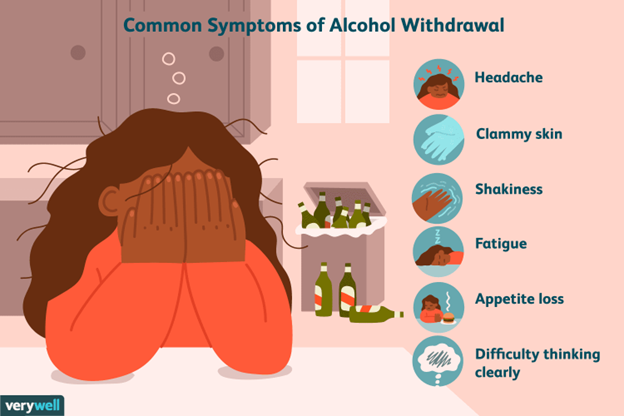A client is admitted to the hospital for alcohol intoxication. The family reports that he is a heavy drinker and has been admitted several times for alcohol detoxification. When can the nurse expect to observe the first symptoms of withdrawal?
Within 24 hours
Within 8 hours
Within 18 hours
Within 72 hours
The Correct Answer is B
A. 24 hours is a long time for alcohol withdrawal symptoms to occur.
B. Alcohol withdrawal symptoms typically begin within 6 to 8 hours after the last drink for
individuals with a history of heavy alcohol use. These symptoms can range from mild anxiety and tremors to more severe symptoms like seizures and delirium tremens. It's crucial for
healthcare providers to monitor and manage alcohol withdrawal symptoms, as they can be life- threatening in severe cases.
C. Alcohol withdrawal symptoms occur within 6 to 8 hours, not 18 hours.
D. Alcohol withdrawal symptoms occur within 6 to 8 hours, not 72 hours.
Nursing Test Bank
Naxlex Comprehensive Predictor Exams
Related Questions
Correct Answer is C
Explanation
A. While understanding precipitating factors is important, it is not the immediate priority when the client is actively experiencing hallucinations.
B. Distracting the client may not address the underlying cause of the hallucinations, which should be the priority.
C. Determining the content of the hallucinations can provide important information for assessment and intervention.
D. Dismissing the client's experience can be alienating and unhelpful.
Correct Answer is B
Explanation
A) Incorrect. Naltrexone does not primarily target withdrawal symptoms. It works by blocking the pleasurable effects of alcohol, reducing the reinforcement that leads to craving.
B) Correct. Naltrexone is an opioid antagonist that reduces the craving for alcohol. It does this by blocking the opioid receptors in the brain, which are involved in the pleasurable effects of
alcohol consumption.
C) Incorrect. Naltrexone is not primarily used to manage anxiety. Its main purpose is to help individuals reduce or stop their alcohol intake.
D) Incorrect. Naltrexone is not primarily used to treat depressive symptoms. Its focus is on reducing alcohol cravings.

Whether you are a student looking to ace your exams or a practicing nurse seeking to enhance your expertise , our nursing education contents will empower you with the confidence and competence to make a difference in the lives of patients and become a respected leader in the healthcare field.
Visit Naxlex, invest in your future and unlock endless possibilities with our unparalleled nursing education contents today
Report Wrong Answer on the Current Question
Do you disagree with the answer? If yes, what is your expected answer? Explain.
Kindly be descriptive with the issue you are facing.
